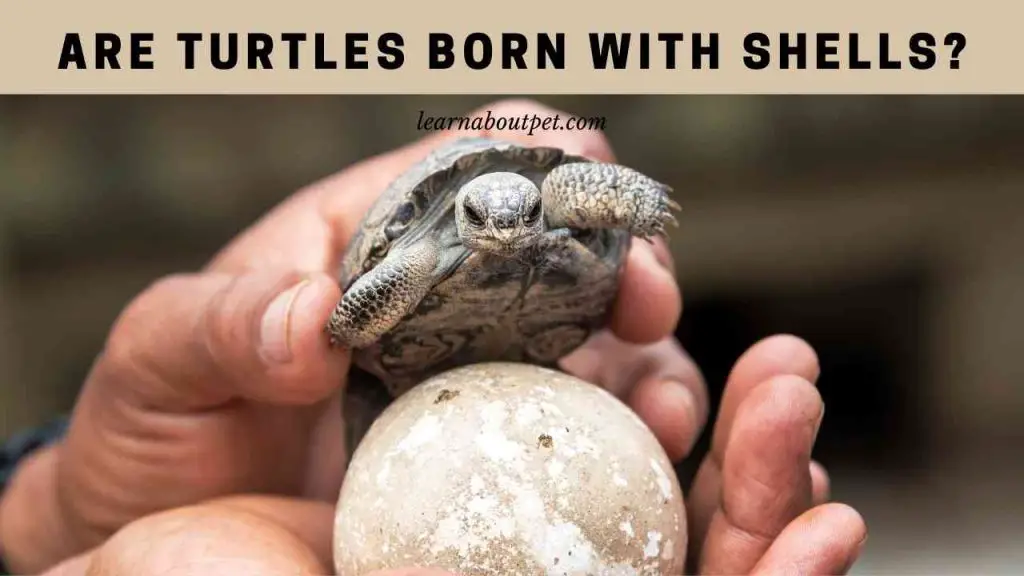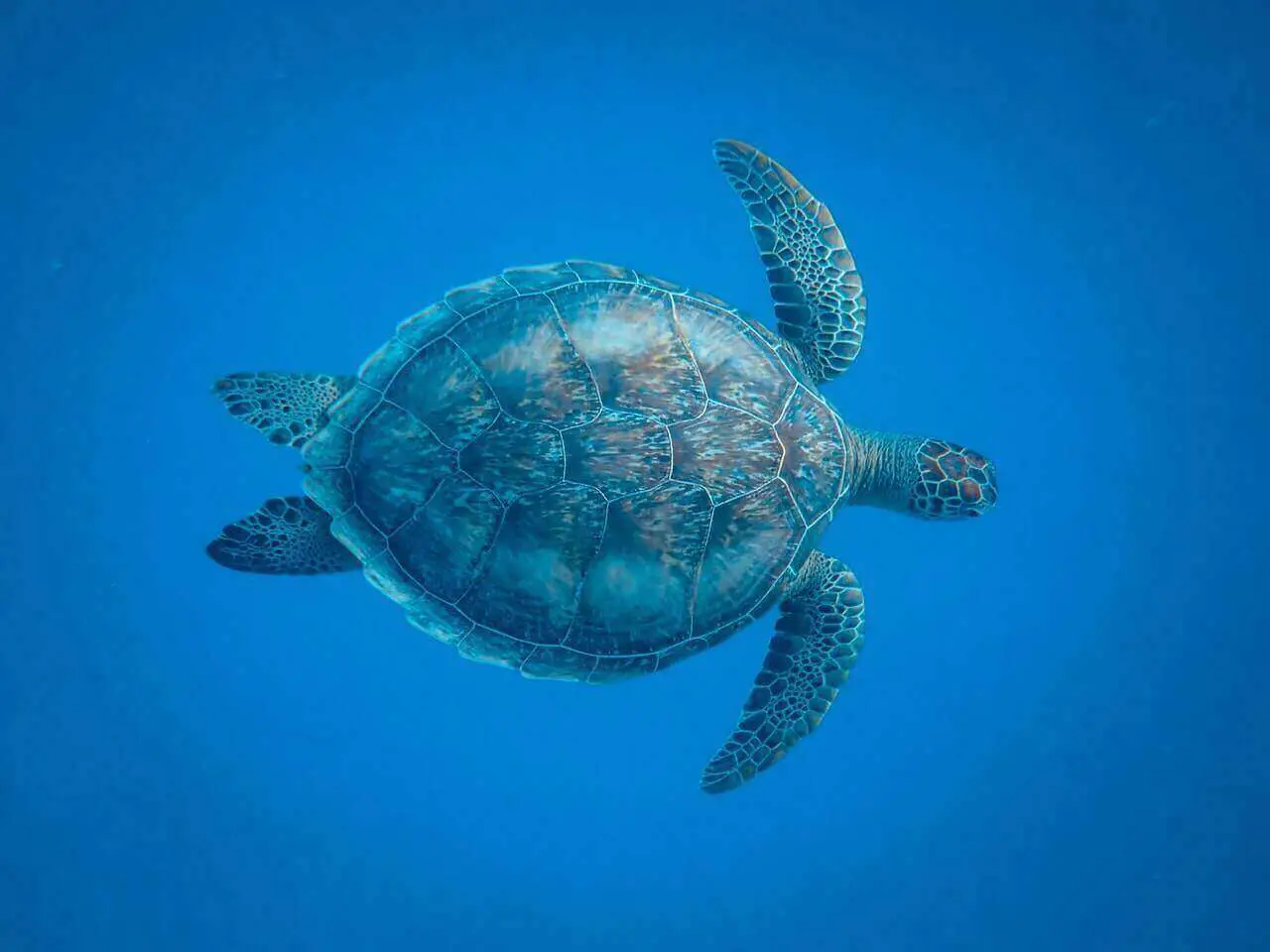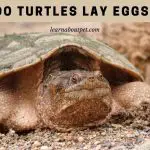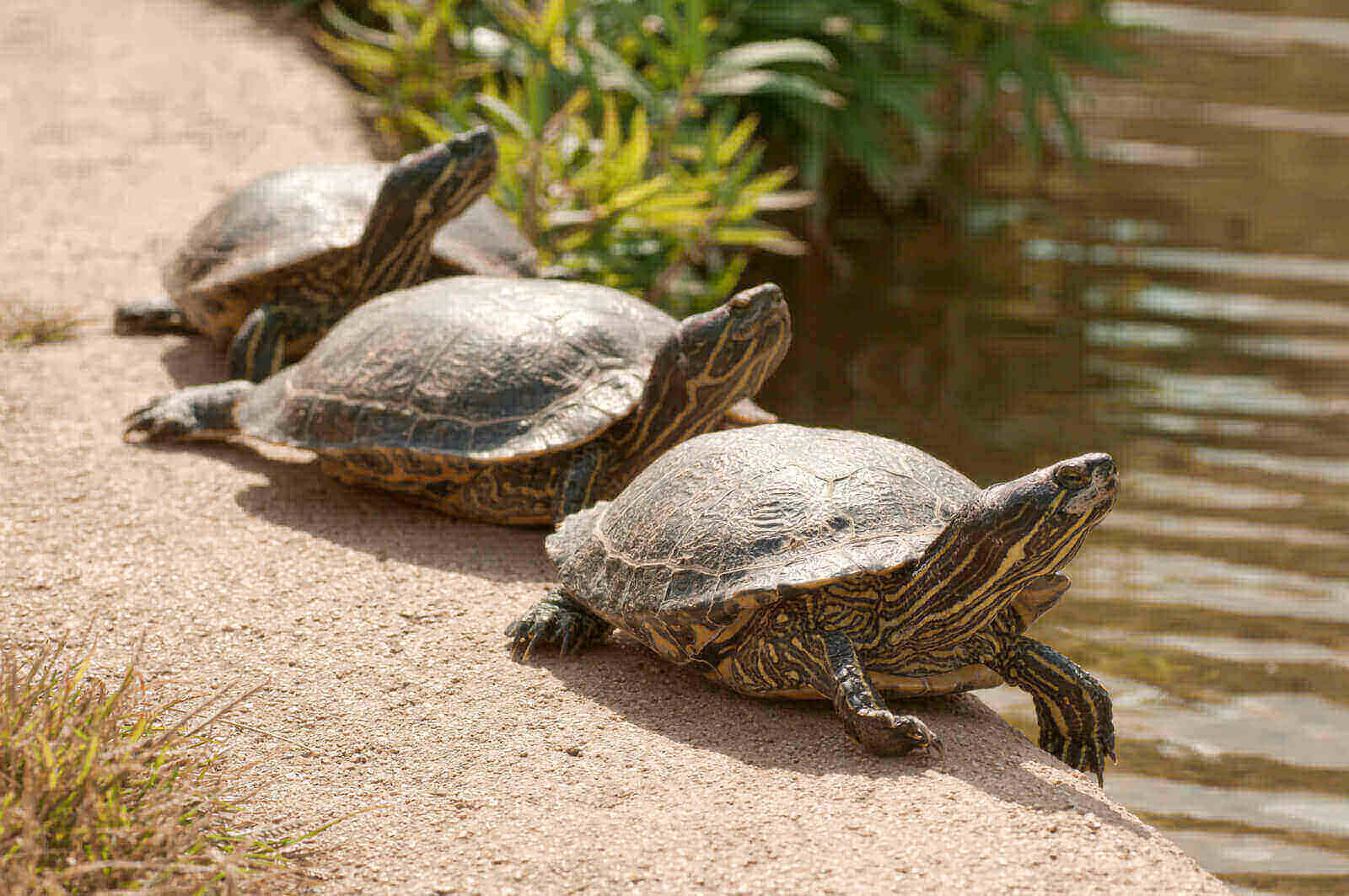Turtle shells are very fascinating. Many people express interest in knowing how these shells come to be. They specifically express interest in knowing whether turtles are born with the shells, or whether the shells emerge later.
Are turtles born with shells? The answer is yes, turtles have their shells right from the time they hatch from eggs. The shells grow proportionally with the turtles. Turtles also don’t shed their shells. They may shed the scutes on the shells, but not the actual shells.
From the shells, turtles get protection from predators and infections. The shells also help them in swimming and in maintaining buoyancy. They are even helpful when it comes to heat absorption. Read on, to find the answer.

It is worth mentioning that the turtle shells are made of fused ribs. Therefore they are part of the turtles’ exoskeletons. They are not fanciful additions to the turtles’ bodies as they appear. On the contrary, they are core parts of the turtles’ bodies.
Why Do Turtles Have Shells?
Before proceeding to answer the are turtles born with shells question, it is essential for us to understand the role that these shells serve.
So, why do turtles need their shells?
The shells we see on turtles serve a wide range of essential purposes.
Most people know that these shells offer protection against predators. When a turtle is up against a predator, it simply goes inside its shell. Because the shell is usually hard, the predator can’t pry it open. Therefore the turtle gets to save its life.
But over and above this role of protecting the turtle from predators, the shell has other purposes.
For one, the shells also protect the turtles from infections. This is because the shells cover the turtles’ vital organs. Therefore the chances of a turtle with a shell getting scratched, and subsequently infected is very low.
Further, the shells help the turtles in swimming. Thanks to the presence of the shells, the turtles are able to make remarkably powerful strokes while swimming.
Further, the shells help the turtles to remain buoyant in water.
And at yet another level, we see that the shells help the turtles with heat absorption.
With this understanding of the role that turtle shells serve, we can now proceed to answer the are baby turtles born with shells question.
Are Turtles Born With Shells?
Turtles are born with shells. These shells are not secondary features that develop at some points in the turtles’ later lives. On the contrary, the shells are core body parts, which the turtles are ‘born’ with.
We put the word ‘born’ in quotes because, strictly speaking, turtles are not born – but hatched. Their mothers lay eggs, from which they then hatch.
Perhaps the idea of a female turtle giving birth to a baby turtle that has a hard shell on its back is one that is hard to imagine.
But once we clarify that the turtles actually hatch from eggs, then how they can have shells right from the word go becomes more plausible.
Still, one may ask, how are turtles born with their shells (considering how big and hard these shells are)?
And the answer is that, at the point of hatching, the shells are usually much smaller and much softer.
The baby turtle shell is frankly nothing like an adult turtle’s shell. It is soft, and small (proportionate to the baby turtle’s body).
Because the shells at that stage are small and soft, they easily come out of the eggs when the young turtles hatch.
Then, due to exposure to hair (and other factors), they harden with time.
So the whole thing is similar to how human babies are born with rather soft skulls. Then the skulls harden with time.
This, in effect, also answers the how do turtles get their shells question. So the answer to it is that the turtles are born with those shells. They have them right from when they hatch. The shells are not things that the turtles ‘get’ at some point.
Are Freshwater Turtles Born With Shells?
Freshwater turtles – the likes of the painted turtle, the red-eared slider and the snapping turtle – are born with their shells.
Therefore if you keep such turtles as pets, and you allow them to breed, you only need to examine the hatchlings to realize that they have shells on them.
True, the shells on the young hatchlings may be rather soft. In fact, the first time you encounter them, you may start wondering, are turtles born with soft shells or is there a problem with mine?
But the fact of the matter is that these freshwater turtles, like all other turtles, start life with very soft shells. Those then harden with time.
Are Sea Turtles Born With Shells?
Yes, sea turtles are born with shells.
So right from the time when they hatch out of eggs, sea turtles have their shells on them.
Sea turtles lay their eggs on land, but close to the sea. When the young sea turtles emerge from those eggs (and find their way into the sea), they already have the shells on their backs.
Therefore you will never find a sea turtle without shell at any point. This is because the shell is there, right from when the sea turtle emerges from the egg.
Admittedly, the baby sea turtle shell is extremely soft at that early stage. Heck, even an adult sea turtle shell is rather soft (with a leathery feel) in comparison to a freshwater turtle shell.
And if the adult sea turtle shell is relatively soft, one can only imagine how much softer the baby sea turtle shell is…
In fact, at birth, the baby sea turtle’s shell is so soft that one may not recognize it as a ‘shell’. That is how one may come up with wild claims of having seen a ‘shell less baby turtle’.
In actual fact though, the sea turtle starts its life with a shell. It is just that the shell, at that early stage, is very soft. But it is a shell all the same.
Are Land Turtles Born With Shells?
Land turtles are born with shells. If you visit a spot where land turtle eggs have hatched, and you examine the hatchlings, you will notice that they have small, soft shells on them.
Land turtles are more or less what we refer to as tortoises. So that answers the are baby tortoises born with a shell question. Therefore the answer is ‘yes’ – though the shell at ‘birth’ may be so soft and small that it is hard to recognize it as such.
An example of a land turtle is the box turtle. In effect then, the answer to the are box turtles born with shells question is in the affirmative. All box turtles have shells when they hatch from eggs.
How Do Turtle Shells Develop?
Alongside the are turtles born with shells question usually comes this one: on how the turtle shells develop.
As a matter of fact, it would be improper to answer the are turtles born with shells question without addressing the matter of how these shells develop.
So, how do turtle shells develop?
The answer is that the development of these shells starts right from when the turtles are embryos in eggs.
Turtle embryo development is divided into 31 stages. And it is at stage 14 (one of the stages that occur in the nest, after egg laying) that the development of the shell really begins.
(Of course, by the time the female turtle is laying the egg, the egg already has encoded genetic information for development of the shell).
Now the 14th stage of turtle embryo development in question here usually occurs roughly 20 to 30 days after the initial embryo growth starts. So it is at this stage that the development of the shell begins.
The growth proceeds gradually, so that by the time the turtle hatches, it has a proper – if somewhat soft – shell.
Various bones fuse, to form the turtle shell.
After the young turtle hatches, there is gradual hardening of the shell. This is due to exposure to air and growth of the dermal bones that make up the shell.
It is also due to thickening of the keratin in the shell.
So in a nutshell, that is how turtle shells develop.

How Do Turtle Shells Grow?
Earlier, while answering the are turtles born with shells question, we saw that the answer is yes.
But when they hatch, baby turtles have small and soft shells. How do these shells then grow into the shield-like edifices that we know as adult turtle shells?
The answer is that the cells that make up these shells undergo division and multiplication, just like all other cells in the body.
Therefore the shell grows at the same pace as the rest of the turtle’s body.
One may then ask, how do turtles shells grow with them – that is, without being left behind or outpacing the rest of the body’s development?
And the answer is that there are growth hormones, which are in turn under the control of genes. Those ensure that the shell cells grow at the same pace as the turtles’ bodies.
Once a turtle reaches its full adult size, and stops growing, its shell also stops growing.
From this point, all that may be happening is shedding of the scutes. But the core shell remains intact.
Do Turtles Change Shells As They Grow?
Alongside the are turtles born with shells question often arises this one: on whether turtles change shells as they grow.
In other words, do turtles get new shells as they go along the various phases of their lives? Or do turtles grow new shells at any point?
The accurate position is that turtles don’t change shells as they grow.
The shells that turtles are born with are the shells they remain with all their lives. So the shells grow in a manner that is proportionate to the turtles’ bodies.
For instance, do baby sea turtles have shells when they hatch? The answer is yes. And it is these turtles that remain on the turtles’ bodies all their lives.
That applies for all other types of turtles.
It is similar to how the bones we (as humans) are born with remain with us all our lives.
When we are born, the bones are small and soft. But they grow and harden. What they don’t do is change.
So we see a similar situation with regard to turtle shells.
If there is any sort of ‘shedding’, it is for the scutes on top of the turtle shells. But the shells themselves don’t shed.
Therefore turtles don’t change their shells as they grow.
Are Turtles Born With Hard Shells?
Often, the people posing the are turtles born with shells question have an interest in specifically knowing whether turtles are born with hard shells.
Now in answering the are turtles born with shells question, we saw that the answer is ‘yes’. All turtles are born with shells.
That is what then leads to this question – on whether turtles are born with hard shells.
The truth of the matter, however, is that turtles are not born with hard shells. Turtles are born with very soft shells.
With time however, the turtle shells become remarkably hard.
If your idea of a ‘shell’ is that of a hardy thing, then you may not recognize the structure that a turtle hatchling starts out with as a ‘shell’. It is rather soft.
But with time, it becomes big and hard: hence capable of offering proper protection to the turtle.
Are There Turtles Without Shells?
At the start of this article, while exploring the are turtles born with shells question, we established that the answer is indeed ‘yes’. Turtles are born with turtles.
You will never find a turtle born without shell.
And as we shall be seeing later, a turtle can’t really survive for long without a shell.
Therefore there are no turtles without shells.
All turtles – freshwater turtles, sea turtles and land turtles – have shells.
The shells are key parts of their exoskeletons.
Asking whether there are turtles without shells is akin to asking whether there are humans without backbones and ribs. And the answer is that there are no such people.
Similarly, there are simply no turtles without shells.
Can A Turtle Live Without A Shell?
A natural extension to the are turtles born with shells question is this one – on whether a turtle can live without a shell.
The answer is that a turtle can’t live without a shell.
Earlier, while answering the are turtles born with shells question, we saw that indeed they are born with shells. These shells are therefore an integral part of the turtles’ exoskeletons.
For that reason, turtles can’t live without them.
The idea of a turtle living without a skeleton is akin to the idea of a human being living without a spinal cord and ribs. It simply doesn’t make sense.
True, the turtle shell often gives this impression that it is an external, additional fixture. But nothing could be further from the truth.
It is actually the bones that make up the turtle’s ribs which fuse, to create the shell.
Consequently, any attempt to remove the turtle’s shell would amount to dismantling the turtle’s exoskeleton.
Once you get the turtle shell removed, it (the turtle) is unlikely to survive for much longer.
It is worth remembering that right below the turtle’s shell are its vital organs. So once you remove the shell, you expose the vital organs – its heart, kidney, liver and so on.
How would a turtle in that situation survive? Therefore it is clear that a turtle can’t live without a shell. If you ever hear of a turtle without shell joke, then you should treat it exactly as such – as a joke.
A real turtle can’t live without a shell because, if nothing else, removal of the shell exposes the turtle’s sensitive vital organs.
What Happens If A Turtle Loses Its Shell?
Earlier, while tackling the are turtles born with shells question, we established that the answer is ‘yes’. Turtles are born with their shells.
Now what happens if a turtle loses its shell?
Firstly, it is important to point out that the shell is not something the turtle can ‘lose’ so easily. True, the shell looks like a loose attachment to the turtle’s body. Something like a shield.
But in actual fact, the shell is part of the turtle’s exoskeleton. It is very tightly fused to the turtle. It is not something the turtle can lose just like that.
But hypothetically, if a turtle were to lose its shell (say, after malicious removal), what would happen?
The key thing that would happen is that the turtle’s vital organs would become exposed. And this sort of exposure would kill the turtle within no time.
But even before getting to this point, chances are that the shell removal process would have killed the turtle.
Shell removal is a painful and brutal affair that no turtle is likely to survive.
So what happens if a turtle loses its shell is that it dies.
Final Verdict – Are Turtles Born With Shells
Turtles are born with shells. If you take the trouble to examine freshly hatched baby turtles, you will notice that they have shells on them.

But at the time of hatching, the turtle shells are soft. They harden with time, thanks to growth of the dermal bones that form them, as well as due to thickening of the keratin in them.
Turtles don’t shed their shells. The shells they are born with are the ones they retain throughout. Only the scutes in the shells may be shed once in a while.
Turtles can’t live without their shells. Therefore if you have a pet turtle, you need to protect it from hurting its shell. And in case of any infections or other issues affecting the shell, you need to get proper treatment fast.
Remember, the shell is not some external addition to the turtle’s body. It is a core part of the turtle’s body, without which the turtle can’t survive.
As a pet lover, make sure to learn about pet more and give your pet turtle a good and comfortable life!

Welcome to Learn About Pet. My name is Rajkumar Ravichandran and I love all pets, travel, and amazing food. I write about my passion and personal experience caring for multiple pets in this blog! ❤️
Post Disclaimer
DISCLAIMER: THIS BLOG OR WEBSITE, "Learn About Pet", DOES NOT PROVIDE YOU WITH MEDICAL ADVICE AND IS NOT A SUBSTITUTE FOR MEDICAL ADVICE. ALWAYS GET IN TOUCH WITH YOUR PERSONAL VETERINARIAN AND USE INFORMATION HERE AS GENERAL ADVICE.
The information, including but not limited to, text, graphics, images and other material contained on this website are for informational purposes only. No material on this site is intended to be a substitute for professional veterinary advice, food recommendation, diagnosis, or treatment. Always seek the advice of your veterinarian or other qualified health care provider with any questions you may have regarding a medical condition or for pet food related questions.







